Glashutte Original Watches
Below is our current in stock inventory of Glashutte Original watches. If you have a Glashutte Original watch you are interested in selling or trading please contact us. To browse by model click here.
All Glashutte Original Watches

(55315) Glashutte Original 1-39-11-06-80-33 SeaQ 13911068033, Satin brushed stainless steel on a strap, Automatic Movement, Black Dial with Luminous Hands and Applied Index Hour Markers, date at 3 o'clock, Uni-Directional Rotating Bezel, Sapphire Crystal, Screw-down Crown, Display Back, Water Resistant to 300 Meters, Size: 39mm, Thickness: 12.15mm, Like New with Glashutte Original box and papers, dated 2021.
$7,200

(54884) Glashutte Original Senator Perpetual Calendar 100-02-22-12-05, 10002221205, stainless steel on a strap with a stainless steel deployant buckle, off-white dial, automatic Glashutte caliber 100-02 movement, 55-hour power reserve, day window at 10 o'clock, month window at 2 o'clock, big date at 4 o'clock, moon phase between 7 and 8, leap year indicator beneath the logo at 12 o'clock, centered sweep seconds hand, diameter: 42mm...
$10,400

(56130) Glashutte Original Senator Excellence Perpetual Calendar 1-36-02-01-02-71, 13602010271, stainless steel case on a matching stainless steel bracelet, automatic Glashutte caliber 100-02 movement with a 55-hour power reserve, off-white dial, day of the week aperture at 10 o'clock, month at 2 o'clock, big date at 4, moon phase between 7 and 8 o'clock, leap year indicator beneath the logo at 12 o'clock, center sweep seconds han...
$15,900

(54748) Glashutte Original 1-39-11-09-81-70 SeaQ 13911098170, satin brushed stainless steel case on a stainless steel bracelet with a fold-over deployant buckle, automatic Glashutte caliber 39-11 movement, galvanic blue dial with luminous hands, applied numerals and indexes with superluminova inlays with luminous markings on the chapter ring and date at 3 o'clock, uni-directional rotating ceramic bezel, sapphire crystal, screw-down...
$7,700

(54924) Glashutte Original SeaQ 1-39-11-13-83-70, 13911138370, satin brushed stainless steel on a stainless steel bracelet, automatic movement, green dial with luminous hands and applied index and Arabic hour markers, date at 3 o'clock, uni-directional rotating bezel, sapphire crystal, screw-down crown, display back, water resistant to 300 meters, size: 39mm, thickness: 15mm. Like New with Glashutte Original box and papers dated Ma...
$8,100

(55230) Glashutte Original Senator Sixties 39-52-01-02-04, 3952010204, stainless steel on a strap with a stainless steel tang buckle, automatic Glashutte Original caliber 39-52 movement, silver dial with applied gold hour markers and painted Arabic numerals, luminous gold hands, centered sweep seconds hand, domed sapphire crystal, transparent sapphire case back, water resistant to 30 meters, size: 39mm, thickness 9.4mm. Like New wi...
$4,800

Glashutte Original SeaQ Black Dial SS
$7,200

Glashutte Original Senator Perpetual Calendar SS White Dial
$10,400

Glashutte Original Senator Excellence Perpetual Calendar White Dial SS UNWORN
$15,900

Glashutte Original SeaQ Blue Dial SS / SS
$7,700

Glashutte Original SeaQ Green Dial/Green Bezel SS
$8,100

Glashutte Original Senator Sixties SS Automatic Silver Dial
$4,800
Browse Glashutte Original Watches By Model
History of Glashutte Original Watches
History of Glashütte Original
Glashütte Original

Glashütte Original is an internationally known German watch firm that has maintained the highest standards of excellence for 165 years. On a par with many of the great Swiss watchmakers in terms of skill, experience, artistry and craftsmanship, Glashütte Original as a company reflects the entire, amazing history of the center of German horology, of the town of Glashütte itself. In many ways, Glashütte Original is a perfect, historical hybrid of the superb watchmakers in that remarkable city.
Few watchmakers - German, Swiss, or those from any other nationality - can produce total in-house timepieces. Today, every one of the hundreds of individual components in a movement made by Glashütte is designed, produced, and ornamented in their manufactory.
The History of Glashütte Original
In 1845, Ferdinand Adolph Lange began the first watch company in the German silver mining town of Glashütte with a loan from the Saxon government. He intended to start an independent Saxon watchmaking industry in Germany and particularly Glashütte. With Lange' boosterism and success, by the 1850's some of the greatest master watchmakers were drawn to Glashütte, such as Adolph Schneider, Moritz Grossmann, and Julius Assmann, whose German Precision Pocket Watch Factory won international prizes. In 1910, Norwegian polar explorer Roald Amundsen purchased an Assmann watch and took it to the geographic South Pole.

By 1865, the typical precision pocket watches made in Glashütte had tremendously advanced, with inventions such as the Glashütte three-quarter plate, gold lever wheels and chatons, and a sunburst finish on the case. This style was the standard for eight decades. Also well appreciated were the Glashütte pendulum clocks, notably those made by Ludwig Strasser and Gustav Rohde in the Strasser & Rohde Mechanical Workshops, founded in 1877. Their precision pendulum clocks were utilized in institutes, observatories, and other watch companies to accurately synchronize marine chronometers and pocket watches. Strasser also achieved importance as a teacher and ultimately the director of the Glashütte German School of Watchmaking, opened on May 1, 1878, by Moritz Grossmann and the Central Association of German Watchmakers. Teachers at the school such as the dynamic and brilliant Alfred Helwig began training some of the finest watchmakers in the world to fill the growing demand for qualified craftspeople (Since 2002, Glashütte Original has had its own watchmaking school named after Helwig).
As early as 1916 Karl W. Hohnel marked one of his pendulum clocks for the first time with the words, "Original Glashütte." The German Precision Watch Factory Glashütte (Sa.) was entered in the trade registry for the first time on November 9th, 1918, using the town' name as part of their trademark, and after 1921, on its pocket watches to show that it was an original Glashütte quality product and not a foreign imitation.
In 1921, Alfred Helwig developed the flying tourbillon, bringing wide acclaim for him and to the school. His tourbillon appeared to "fly" because it was only attached on one side with twin bearings guiding the wheel staff. This allowed the escapement and tourbillon to be attached without a top cock so the tourbillon appeared to fly. With less pressure on it, the mechanism produced the best rate precision of any portable watch.


In 1926, to meet growing demands for wristwatch movement blanks, a new company was founded in Glashütte called UROFA, an offshoot of the Glashütte Precision Watch Factory. UFAG, another new company, finished and distributed the watches. In 1927, a ladies watch was produced with "Glashütte Original" imprinted on the dial for the first time.
On July 1st, 1952, the public company, Glashütte Watch Factories, was created from a merger of eight local firms. These included UFAG, UROFA, VEB Lane (formerly A. Lange & Sohne), VEB Estler, VEB Feinterchnik, VEB Prasision Glahsütte, and the Makarenko trade school. One of the initial creations was the chronograph movement 64, originally the UROFA caliber 59.
In the 1960'' Glashütte produced elegantly designed, durable timepieces made for constant daily use. Men and women' wrist watches were created with shock resistance, date display, sweep seconds, automatic winding, and above all, improved accuracy. The Glashütte reputation began to soar in Europe. In the early 60', the caliber 70 series mechanisms were produced, including the caliber 70.1 and 70.3, which included a gilded balance rim and came with a chronometer test certificate. In the mid 60' the "Spezimatic" movements were debuted. The caliber 74 was automatic, and the caliber 75 was automatic with a date. The movement was diminutive in profile at 4.4 mm. high and a diameter of only 28 mm.
The "Spezichron" watch arrived in 1978, with a date display and the day of the week moved by a ball bearing mounted rotor. It was produced into the mid 1980'. The 70' saw the rise and worldwide Japanese invasion of the quartz watch; despite the dizzying demand, the Glashütte watchmakers refused to convert their whole production to this enormous change. But they did make some wonderful contributions to the technology with the first quartz-powered marine chronometers. Glashütte had been known for years for its classic marine chronometers; by 1978 over 13,000 had been made, and the caliber 31 created a new era for quartz wristwatches. They were particularly well suited for ladies watches because the mechanisms were smaller. Glashütte also made a two-hand/analogue-digital quartz movement for men in the 1980'.
In 1990, after the reunification of Germany, the company officially became Glashütter Uhrenbetrieb GmbH. It became the legal commercial heir to every former independent watchmaker in Glashütte as far back as 1951. The brand name officially became Glashütte Original in 1994, already a hallmark of precise German horology.
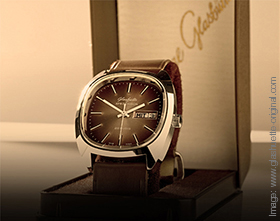
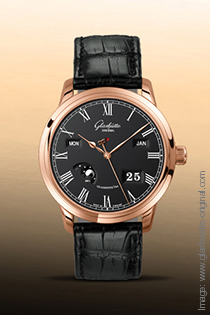
At the turn of the new millennium, Glashütte Original received the "Watch of the Year" honor in Germany for its Senator Perpetual Calendar (100-02-25-05-05) in 2000. The Swatch Group Ltd. Acquired the manufactory of Glashütte Original in October for their luxury watch compendium, taking the company from being a locally important brand to a global name. In 2001 the new Glashütte Original Alfred Helwig School of Watchmaking opened in September, with the idea to produce qualified watchmakers to continue the traditional craft. Upon his or her graduation every Helwig School student is guaranteed a position with the Swatch Group Company. On September 8, 2003, after over a year of construction, a magnificent, completely restructured manufactory opened, offering the public the opportunity to visit the production stations and actually view the process of watchmaking at its finest. World famous symphonic conductor Kurt Masur was given the first Glashütte Original Music Festival award in 2004 in honor of his life' work and his support of emerging artists, that core philosophy of the Glashütte watchmakers. Since 2009 the award has been given to an exceptional artist every year.
The German Watch Museum Glashütte had its debut on May 22, 2008, built by the foundation of the same name by Swatch Group chief Nicolas Hayek. The museum was designed to illustrate the history of watchmaking in Glashütte, as well as breathtaking exhibitions dealing with the measurement of time. In 2012 the company became a partner of the Berlin International Film Festival for the 61st Berlinale. They also funded the "Made in Germany Perspective Fellowship" to support rising German directors with their film projects. 2012 was also important to the manufactory for introducing their ultimate masterpiece - the Grande Cosmopolite Tourbillon (89-01-03-03-04). They also opened a new boutique in Dresden as well as a new production facility in the Frühlingsweg.
Current Glashütte Original Watches
Glashütte Original handcrafts every precision component for every watch. Although their collection is smaller than the large companies, what they create is superb. They call their collections the "4 Pillars." These are four outstanding lines that offer some of the most beautiful watches in the world:
Art & Technik
The ten watches in this collection are technical masterworks indicative of traditional, premier German engineering. They're all round cases with leather straps or bracelets. The capstone is the exquisite, Grande Cosmopolite Tourbillon (89-01-03-03-04). This incredibly complicated timepiece is astonishing. The classic round platinum case surrounds functions of hours, minutes, a 24 hour home time sub dial, a second time zone with hours and minutes, a daylight savings indicator, a flying tourbillon with small seconds around it, a panorama date, a perpetual calendar, a diurnal/nocturnal indicator, and a power reserve display. Also included are the Pano Lunar Tourbillon (93-02-05-05-05), the PanoGraph (61-03-25-15-05), PanoReserve (1-65-01-25-15-04) and the PanoInverse XL (66-01-04-04-05) with its floating, transparent complications. The elegant PanoMatic Lunar (90-02-42-32-05) and PanoMatic Counter XL (96-01-02-02-04) have off-center sundials on black faces, and the three Senator watches are clean in design but beautifully appointed with complications, including the Senator Diary (100-13-01-01-04) with an alarm that can be set up to 30 days ahead of time.
Images: www.glashuette-original.com
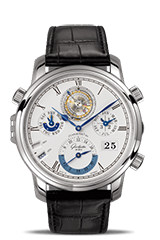
Grande Cosmopolite Tourbillon
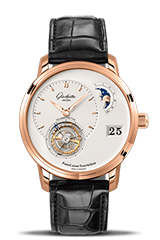
Pano Lunar Tourbillon
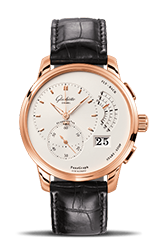
PanoGraph
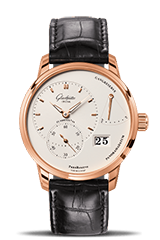
PanoReserve
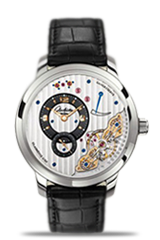
PanoInverse XL
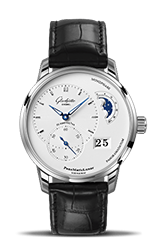
PanoMatic Lunar
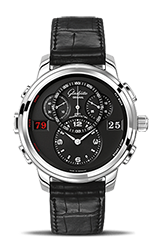
PanoMatic Counter XL
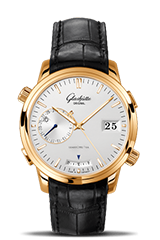
Senator Diary
Quintessentials
There are eight watches in this group including the beautiful Senator Chronometer (58-01-01-01-04), and the straightforward designs of the Senator Panorama Date (100-03-32-45-04)
and Senator Panorama Date Moon Phase (100-04-32-15-04). There's the Senator Automatic (39-59-01-02-04) Senator Hand Date (39-58-02-02-04), Senator Chronograph XL (39-34-20-42-04) the Senator Observer 100-14-02-02-04), and the fascinating Senator Chronometer Regulator (58-04-04-04-04).
Images: www.glashuette-original.com
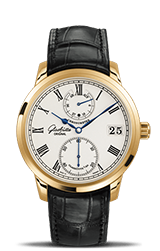
Senator Chronometer
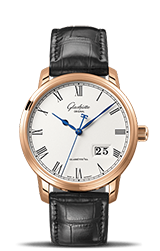
Senator Panorama Date
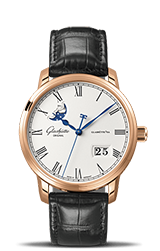
Senator Panorama Date Moon Phase
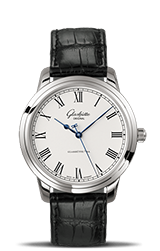
Senator Automatic
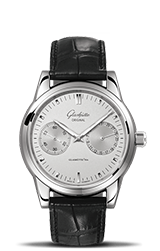
Senator Hand Date
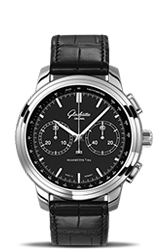
Senator Chronograph XL
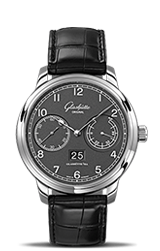
Senator Observer
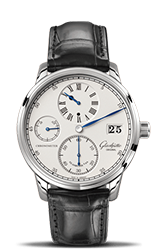
Senator Chronometer Regulator
20th Century Vintage
These five watch styles celebrate the two decades of the 1960' and 1970'. The automatic Seventies Panorama Date (39-47-11-12-14) has a square face with hours, minutes, seconds, second stop, and panorama date. There are nine variations made in stainless steel with matching bracelets, rubber, or leather straps. The Sixties Panorama Date (39-47-01-01-04) comes in five styles, in either stainless steel or 18K rose gold. The Sixties watches (39-52-01-01-04) are vintage, round designs in stainless or rose gold, with silver, black, or blue dials. The Sixties Square Chronograph (39-34-02-32-04) comes in either a silver or black face, with hours and minutes, small off-center seconds, second stop, chronograph with stop second, and a 30 minute display. There is also a round Sixties Chronograph (39-34-02-22-04) with a silver or black dial.
Images: www.glashuette-original.com
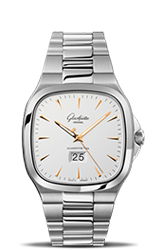
Seventies Panorama Date
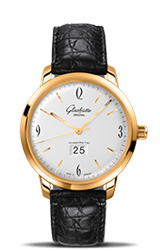
Sixties Panorama Date
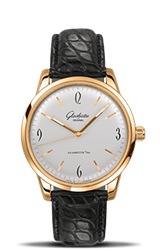
Sixties
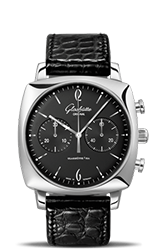
Sixties Square Chronograph
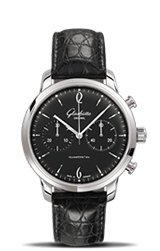
Sixties Chronograph
Ladies Collection
Glashütte Original takes great pride in their lines for women. These are three elegant watches with a tremendous array of variations. The Lady Serenade has 49 different styles with a classic oyster case in either stainless or 18K rose gold. The dials come in an assortment of beautiful finishes including brown, silver, and white or blue mother-of-pearl. A diamond bezel and decorative x-shaped index on the face are also options. The round automatic PanoMatic Lunar has four variations in stainless steel with several complications including off-center hour and minute dials, small seconds, second stop, Panorama date, and moon phase. The bezels have diamonds and the dials come in either light or Tahiti (grey/silver) mother-of-pearl. The Pavonia watches are a debut collection of dazzling timepieces for women. These square case styles come in 24 variations; eight are stainless steel, eight more are in combinations of stainless with 18K rose gold appointments either on the watch or the bracelets, and eight are in solid rose gold. Four of those eight have a unique dial design with 114 diamonds diagonally ornamenting the upper half of the face. The Pavonia watches are offered in an assortment of lovely matching bracelets and straps.
Images: www.glashuette-original.com
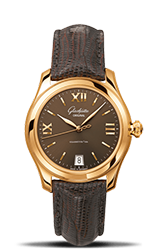
Lady Serenade
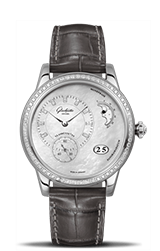
PanoMatic Lunar
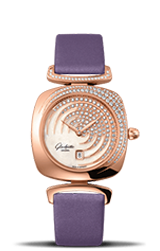
Pavonia
Other Senator Perpetual Calendar Models
100-02-03-02-04, 100-02-04-02-14, 100-02-13-02-04, 39-50-01-11-04 , 100-02-22-12-05, 100-02-05-03-04, 100-02-25-12-05, 100-02-22-12-14, 100-02-25-12-14, 100-02-22-05-05
Other PanoGraph Models
61-01-02-02-04, 61-01-03-03-04, 61-01-01-01-0, 61-03-25-15-04
Other PanoReserve Model
65-01-02-02-04, 65-01-01-01-04 , 65-01-02-02-04, 1-65-01-22-12-04, 1-65-01-23-12-04, 1-65-01-22-12-24, 1-65-01-23-12-24, 1-65-01-25-15-05
Other PanoInverse Models
66-06-04-22-05, 66-05-25-25-05, 66-01-01-01-05, 66-06-04-22-14
Other PanoMaticLunar Models
90-02-02-02-04, 90-02-02-02-24, 90-02-43-32-05, 90-02-42-32-24, 90-02-45-35-04, 90-02-45-35-05
Other PanoMatic Diary Models
100-13-02-02-04, 100-13-04-04-04
Other Senator Chronometer Models
58-01-01-04-04
Other Senator Panorama Date Models
100-03-13-02-04, 39-47-03-02-04, 100-03-11-01-04
Other Senator Panorama Date Moonphase Models
(100-04-11-01-04, 100-04-13-02-04, 100-04-13-02-14, 100-04-02-01-04)
Other Senator Automatic Models
39-59-01-05-04, 39-59-01-12-04, 39-59-01-15-04
Other Senator Hand Date Models
39-58-01-02-04, 39-58-01-02-14, 39-58-02-02-14
Other Senator Chronograph XL Models
39-58-02-02-04
Other Senator Observer Models
100-14-02-02-14, 100-14-05-02-04, 100-14-05-02-14
Other Seventies Panorama Date Models
39-47-11-12-04, 39-47-12-12-04, 39-47-13-12-04, 39-47-12-12-14, 39-47-13-12-14
Other Sixties Panorama Date Models
39-47-01-02-04, 39-47-03-02-04, 39-47-06-02-04, 39-47-02-01-04
Other Sixties Models
39-52-01-02-04, 39-52-04-02-04, 1-39-52-06-02-04, 39-52-02-01-04
Other Sixties Square Chronograph Models
39-34-03-32-04
Other Sixties Chronograph Models
39-34-03-22-04
